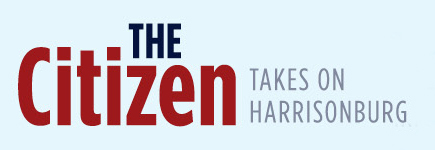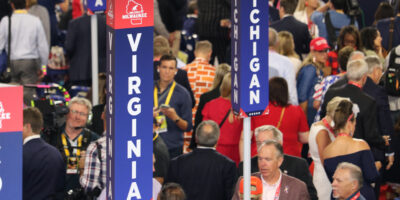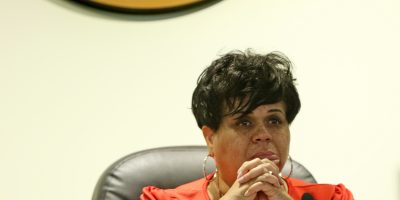
By Calvin Pynn, contributor
Next week, State Senator Mark Obenshain and Delegate Tony Wilt, both Republicans, will head to Richmond next week for the 2021 session of the Virginia General Assembly. On Thursday, The Citizen spoke with both of Harrisonburg’s state legislators about the bills they’ve already introduced, their expectations for the session, and the political chaos unfolding in Washington, D.C. and more.
Insurrection at the US Capitol
The General Assembly will convene just one week after a mob of President Donald Trump’s supporters stormed the Capitol building as Congress met to certify the victories of President-elect Joe Biden and Vice President-elect Kamala Harris. Wilt and Obenshain joined numerous fellow Republicans at both the state and federal level in condemning the violence, which resulted in the shooting death of one woman, in addition to damaging the building and delaying the confirmation hearing.
Obenshain called the violence “anti-American” in a tweet Wednesday afternoon, while Wilt said those participating should be prosecuted in his own tweet a few hours later. Both stood by those statements on Thursday.
“I think those who defied the police, those who broke into the Capitol are clearly guilty of committing crimes and they ought to be punished for it,” Obenshain said, during a phone interview. “I think that it was a dark day in American history to see that kind of desecration of our national institutions. And I think that there also were a lot of well-intentioned people who were up there who tried to exercise their First Amendment speech, but I think those who incite that kind of violence are out of line. I oppose efforts to subvert the constitution. I just hope that America can bind up its wounds, get about its business, and move on to brighter days.”

Also reached by telephone, Wilt reiterated his comments made online on Wednesday.
“Now we’re in the process of folks poking blame, if you will – you know: ‘it was this group or that group.’ And so I hope that law enforcement is finding any individuals – if it makes any difference what group they were in – to get to the bottom of who started it.”
Obenshain bills address wills, parole board

Obenshain will arrive in Richmond having pre-filed four pieces of legislation. Two of his bills – SB 1104 and SB 1125 would require greater transparency and advance notification to victims and prosecutors prior to an offender’s release through parole. The other two, SB 1123 and SB 1124, are written to protect elderly Virginians’ wills from undue involvement of interested parties. Both sets of bills were inspired by problems Obenshain has observed as a legislator and attorney.
The Citizen: What was the motivation behind the bills about parole?
Obenshain: These two bills kind of work together. Last year, it became apparent that the Virginia state parole board decided that it was going to ignore the law and pursue its own goals, irrespective of what the law said with respect to release of violent felons. It was ignoring provisions requiring notification of law enforcement before releasing violent felons and the communities and ignoring the provisions requiring the notification of victims before releasing people who had perpetrated often violent crimes against them and their families. And the parole board was doing this without giving even any notice to the public that they had released these folks. That’s in violation of the law, and the parole board claimed that they were confused. I don’t believe it, but a broad bipartisan coalition of Republicans and Democrats in the General Assembly decided that the best course was to spell out exactly what their obligations are so that there could not even be an argument of confusion. And while we were at it we determined that this process needs more sunlight as well, and that the media and the public at large also should be told what jurisdiction the prisoners had committed the crime and what crime they’d been convicted of right now.
The Citizen: Tell us about any backstory to your legislation regarding wills?
Obenshain: These two bills deal with a much broader issue that has been of great importance to me. A year ago, I tried a case in Fairfax County in which a lawyer wrote a will for an 80-plus year old woman in which he thought he could get away with naming himself as the sole beneficiary of her estate. And a jury unanimously concluded that it was a product of his fraud. That happens all too often, and these bills are aimed at a narrow cross section of elder abuse. One of the ways that people steal from the elderly is through scams, some are more artful and more elegant than others.
The Citizen: I noticed that one of these bills, requiring a disinterested witness to a will, is already required in other states. Why not Virginia?
Obenshain: I can’t imagine why anybody would oppose that. It’s a simple, common sense protection against exploitation and fraud. If a caretaker is named as beneficiary in the will of an elderly patient, and as the sole beneficiary, it’s suspicious enough as it is. But once a will is validly executed by two legal witnesses, which that caregiver would be under current law, it adds extra barriers to attack on that will, and it is very difficult to challenge a will. Most states have required witnesses to the wills to be disinterested. And it’s long overdue for Virginia to make that change as well.
Wilt proposes Constitutional amendment, new agricultural tax credit

Wilt will pursue an amendment to Virginia’s constitution that he introduced during the general assembly’s special session in November. If ratified, the amendment – HJ 513 – would prevent a Governor’s executive order restricting the normal activities of businesses or people from lasting more than 45 days, unless a special session of the General Assembly authorizes an extension.
He has also prefiled a bill – HB 1763 – that would create an income tax credit for farmers, equal to 75% of the first $100,000 they spend on implementing certain best agricultural management practices.
The Citizen: Beyond the pandemic and the current executive order, what does this proposed amendment mean for similar situations in the future?
Wilt: We’re still under this state of emergency now, and we can argue the merits of whether we should be or not, especially now that we’ve seen the COVID numbers shooting back up. But that’s not the issue I’m looking at here. I’m looking at the fact that – number one – a governor, when he issues these orders, has to obey the law. And to me, there’s a separation of powers. And when one of these orders can be mandated, that it can go on for nearly a year, that’s what I’m concerned about.
The Citizen: What has been the reaction to this proposed amendment among other legislators in the House?
Wilt: Honestly, I’ve not heard a whole lot from anyone on it. There was some support for it back during the special session. As I recall, I’m pretty safe saying that it would have been my fellow Republicans that were supporting it. But I’m hoping people across the aisle realized this is not a Republican or Democrat issue. I can honestly say to you and to everyone that listens or reads the article here that if it was a Republican governor, I’d do the same thing. The legislature makes the laws, not the governor.
The Citizen: What’s the purpose of this tax credit in the bill?
Wilt: So the way it works, we currently have a small tax credit now, it’s like 25%. And there’s also a grant program. But some people don’t like the whole idea of a government grant. I’m not pointing fingers at the Old Order Mennonite community, just using them as an example, but I had them in mind because there are a lot of Mennonite farmers doing best management practices. They don’t take government assistance, they don’t take grants and that kind of a thing, but they may take a tax credit. And so the whole thing was just to try to develop another tool for the ag community’s tool belt.
A mostly physically-distant session
Although state lawmakers’ offices have generally had open-door policies in other years, the Pocahontas building will be closed to the public during the 2021 session due to public health measures to reduce the spread of COVID-19. The Senate will convene in person at the Virginia Science Museum, as it did during its last special session, while the House will meet virtually.
While an alternative office space in downtown Richmond will allow lawmakers to meet with a limited number of constituents, both Wilt and Obenshain believe it will be a crucial element missing from the 2021 session.
The Citizen: How would having less interaction with your constituents impact this current session?
Obenshain: In a typical General Assembly session, we deal with nearly 3,000 pieces of legislation over six or eight weeks. And there’s no possible way that every one of us can fully understand the intricacies and implications of each piece of legislation. We rely heavily upon our constituents and others to alert us to their concerns about pieces of legislation. In the absence of that feedback and that access, we’re gonna make mistakes. And some of those mistakes could be really big. As a consequence of our concern, both the House and Senate Republicans have asked that we limit this session during these extraordinary times to the constitutional 30 days that is now allocated. We typically extend that to 45 days but we ought to really be taking care of what’s essential and not addressing people’s brochure bills and items that aren’t of critical significance.
Wilt: I did not like the virtual special session that we did. I think it does a disservice to the citizens of Virginia. I’m in business, and I can tell you that when someone calls me trying to sell something over the phone, it’s easy to say no. But when you set up an appointment to see me, I’m more inclined to listen. So, the same principle applies here. The whole process when it comes to legislation is predicated on that kind of communication.
Redistricting without Valley representation
On Wednesday, eight citizens who will serve on a bipartisan redistricting commission were selected from dozens of applicants from across the state. None of them – nor any of the committee’s legislator members – are from the Shenandoah Valley, to the disappointment of both Wilt and Obenshain.
The Citizen: With no one representing the Shenandoah Valley on the committee, what impact could that have when drawing up legislative districts?
Obenshain: It does give me a considerable concern. It’s my hope that the commission will respect goals of compact and contiguous districts. And if they do that, I think the Shenandoah Valley ought to be in good shape. I mean, that’s one of the characteristics of the Valley. It has distinct geographic boundaries and it should be easy to craft compact and contiguous districts without carving up the Shenandoah Valley and distributing its votes across central Virginia or something like that. So I hope that the commission respects those Constitutional values and that those principles will be applied statewide, not just in the areas of importance to the actual members of the commission.
Wilt: I was very disappointed that we didn’t have some representation from our side of the mountain, but that’s what I’ve told people since I’ve been in the House. It’s often in reference to economic development and funding, and those kinds of initiatives. Sometimes we’ve got to remind people that we’re over here. They tend to sometimes overlook us. And from an economic standpoint, it’s not always the worst thing, because I firmly believe that we, on this side, we have a reputation of picking ourselves up by our bootstraps and figuring out answers to problems and getting it done and making the best use of a dollar, stretching a penny out to make a dime, or whatever you want to call it. We have that reputation, and I’m proud of that, but that’s why we always have to be on our toes in Richmond.
Journalism is changing, and that’s why The Citizen is here. We’re independent. We’re local. We pay our contributors, and the money you give goes directly to the reporting. No overhead. No printing costs. Just facts, stories and context. We’re also a proud member of the Virginia Press Association. Thanks for your support.











